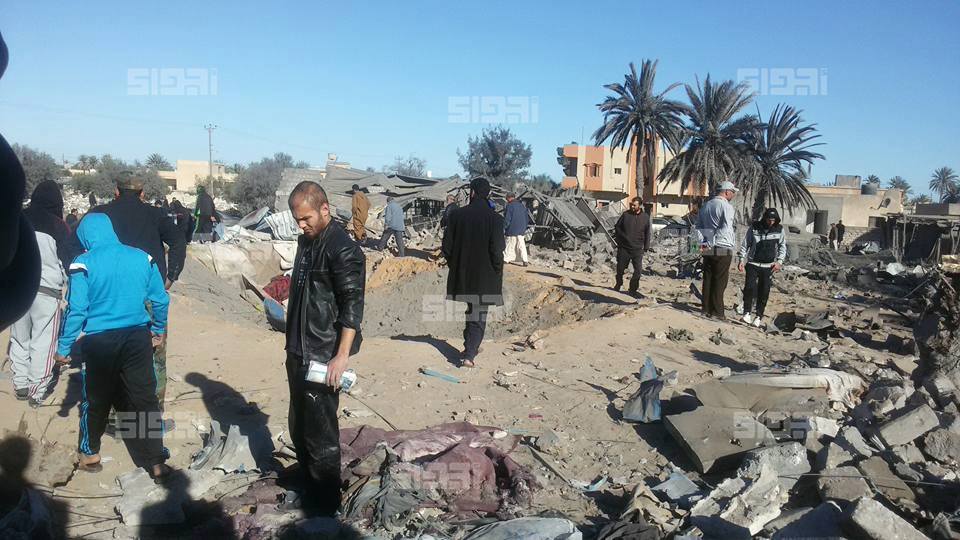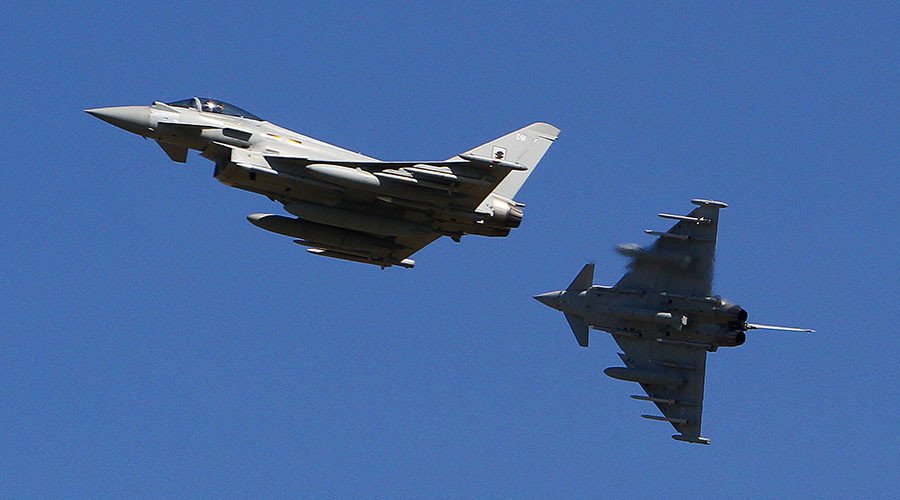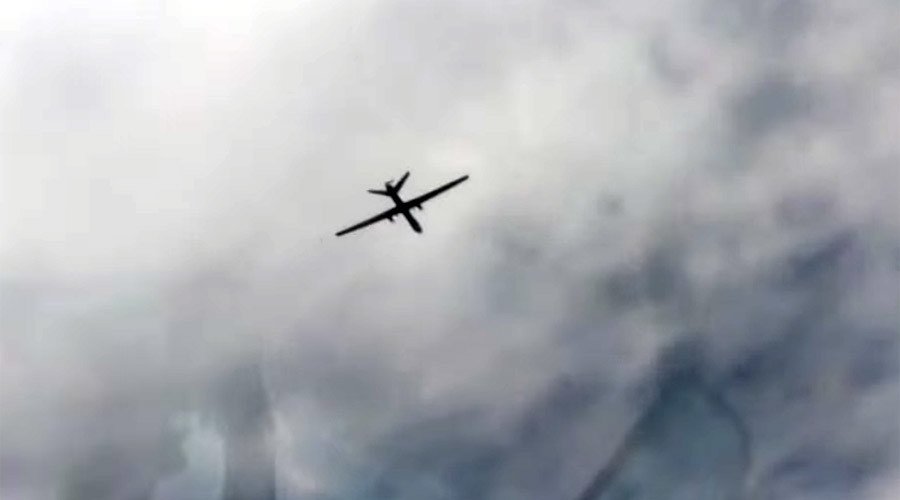Will
the US take a leaf out of Russia’s book and provide video evidence,
force us to take their word, or continue to steal Russian footage?
"CNN
have only two news today:
-
President Bush, President Klingon and President Hussein Obama spoke
against Donald Trump at once
-
Great Victory of our Air-Force against a beach in Libya"
US warplanes strike ISIS camp in Libya, more than 40 reported killed
RT,
19
February, 2016
US
warplanes hit an Islamic State camp in the Libyan city of Sabratha
early on Friday, according to a US military spokesman. The airstrike
killed as many as 40 people.
The
airstrike specifically targeted a Tunisian, Noureddine Chouchane,
also known as “Sabir”, a senior operative believed to be behind
the deadly attack on the Bardo Museum in Tunis in March, 2015, the
Pentagon press secretary Peter Cook said in a statement on Friday.
The
present results of the operation are being assessed, according to
Cook.
“Destruction
of the camp and Chouchane's removal will eliminate an experienced
facilitator and is expected to have an immediate impact on ISIL's
ability to facilitate its activities in Libya, including recruiting
new ISIL members, establishing bases in Libya, and potentially
planning external attacks on US interests in the region,” the
statement reads.
The
mayor of Sabratha, Hussein al-Thwadi, told Reuters that the planes
struck at 3:30am local time, hitting a building in the Qasr Talil
district, where foreign workers were living. He said 41 people were
killed and six others wounded.
جانب من آثار الدمار الذي خلفه قصف طيران مجهول لمنزل بضاحية تليل جنوب غرب مدينة #صبراتة فجر اليوم الجمعة. #أجواء_نت
Chouchane
has been linked to two major attacks in Tunisia in 2015 – one which
killed 22 people in an assault on the National Bardo Museum, and one
that killed 38 people at a beach resort in Sousse.

The
BBC reported that British bases are believed to have been involved in
the Friday attack.
It
comes just days after US President Barack Obama said he has been
“clear from the outset that we will go after ISIS wherever it
appears, the same way that we went after Al-Qaeda wherever they
appeared.”
“We
will continue to take actions where we’ve got a clear operation and
a clear target in mind,” he said, adding, “As we see
opportunities to prevent ISIS from digging in, in Libya, we take
them.”
Both
American and British special operations teams have increased
reconnaissance missions to Libya in recent months, aiming to identify
IS leaders and their networks for possible strikes.
The
head of the foreign news media office in Tripoli, Jamal Naji Zubia,
said the strikes targeted a farmhouse about six to nine miles outside
Sabratha, which had been seized by IS militants.
“They
came individually to the house from different places,” he said,
adding that most of those killed were Tunisian. Some officials
believe the militants had gathered on Friday to hear a speech by a
Muslim religious leader.
The
US is launching airstrikes against IS in Syria and Libya, though it
does not have a UN Security Council mandate to do so.
Jumping the gun? British jets already flying Libya missions, preempting political agreement http://on.rt.com/7472
The
airstrike comes as Libya marks the fifth anniversary of the
Western-backed uprising against Muammar Gaddafi. Since then, the
country has been in political chaos and facing a growing threat from
IS, which is looking to capitalize on the lack of stability and
infighting among politicians.
Although
Washington and its allies maintain they did the right thing by
overthrowing the regime, Amnesty International has slammed NATO
coalition members, saying they need to be “held to account” for
the “horrors that have unfolded in Libya.”
Earlier
this week, Libya's Presidential Council announced the formation of a
revised national unity government under a UN-backed plan aimed at
ending the country's conflict.
A
list of 13 ministers and five ministers of state has been sent to the
country's eastern parliament for approval.
Pentagon
press secretary Peter Cook confirmed in January that the US is
“looking at military options” in relation to Libya, adding that
US troops on the ground have been working to “get a better sense of
who the players are, who might be worthy of US support.”
“I’m
not going to tell you exactly what the disposition of our forces are
there,” he said. “I can acknowledge that we've had forces on the
ground previously as we've indicated, to engage in conversations with
local forces to get a clearer picture of exactly what's happening
there.
“The
reason for the presence of those troops is to, again, get a sense of
the forces on the ground, the players on the ground and exactly
what's happening, because it is a muddled picture right now. And we -
that is one of the best ways we can get a better sense of what's
happening.”
That
statement followed a similar remark by General Joseph Dunford Jr.,
chairman of the Joint Chiefs of Staff.
“It’s
fair to say that we’re looking to take decisive military action
against ISIL [in Libya] in conjunction with a legitimate political
process,” Dunford said in January. “The president has made clear
that we have the authority to use military force.”
According
to Dunford, the US, France, Italy and the UK are looking at how to
curb the growth of IS in Libya before is spreads further across the
region. He said it was important to “put a firewall” between IS
in Libya and other Islamic extremist groups on the African continent,
while working to strengthen African militaries and governments to
fight the militants themselves.
“Although
I want to move quickly, we’ve got to make sure we do this right,”
Dunford said last month.
Despite
US troops on the ground in Libya, it was reported in December that
when 20 US soldiers were dropped with their vehicles near Watia,
Libya, local officers and soldiers “refused their intervention,
disarmed them and forced them off Libyan lands.”
Senior
US defense officials confirmed to NBC News that the incident had
taken place, adding that US forces have been “in and out of Libya”
for “some time now” to advise Libyan forces.
DoD,
State Dept. struggle to explain Libya strike legality with 15yo
authorization & some intl law

RT,
20
February, 2015
Having
confirmed a strike on an ISIS camp in Libya, Washington officials had
difficulties explaining under which legal authority the US acts.
While the Pentagon cites post-9/11 legislation, stripped of such
powers, the State Department refers to unnamed international laws.
On
Friday, the US announced that its warplanes targeted a training camp
near the Libyan city of Sabratha, reportedly killing up to 40 people.
The Pentagon has treated the attack as a success as it declared the
elimination of a Tunisian national, Noureddine Chouchane, who was an
Islamic State (IS, formerly ISIL/ISIS) facilitator in Libya.
Also
known as "Sabir," the militant is believed to be behind the
deadly attack on the Bardo Museum in Tunis in March 2015.
BREAKING: US warplanes strike ISIS camp in Libya, killing more than 30 – report http://on.rt.com/74xb
However,
regardless of its achievement, the US authority to carry out strikes
on Libyan soil has again come into question. It has appeared that
Washington does not have a single answer.
After
briefing reporters on Friday, the Pentagon press secretary Peter Cook
was asked to clarify under what authority the US came to Libya, given
that no Americans had been killed in the 2015 Tunisia attack.
“We
have struck in Libya previously under the existing Authorization for
the use of [military] force,” Cook replied.
The
Pentagon’s spokesperson allegedly referred to the AUMF, which was
passed and then signed by President George W. Bush shortly after
9/11, in September 2001, to target al-Qaeda. It authorized United
States Armed Forces to carry out attacks against those responsible
for September 11.
However,
the Defense Department “believes” that the AUMF can be used 15
years later to fight ISIS.
“We
believe that this was carried out under international law and,
specifically, that this operation was consistent with domestic and
international law,” Cook said, while not explicitly referring to
any particular legislation.
In
February 2015, President Obama did propose his own AUMF, which “does
not address the 2001 AUMF”, but the draft was rejected by the
Congress in December.
Other
AUMF drafts, including for example, one of the most recently
submitted by Senate Majority Leader Mitch McConnell, have not gotten
Congressional approval either.
RT
has also tried to clarify the US’s authority for the attack with
the State Department, but failed to get a conclusive answer.
RT’s
Gayane Chichikyan: “Under what legal authority did the US carry out
strikes in Libya this morning?”
State
Department’s Mark Toner: “It was in full accordance with
international law. We’ve talked about this many times. I’d refer
you to the Department of Defense to speak about specifics.”
Chichikyan:
“So not the AUMF? It’s – it was international law?”
Toner:
“Exactly. I mean – exactly.” He then refused to “get into
details here,” again readdressing the question back to the
Pentagon.
Approved
by ‘some Libyan authority’?
At
the same time both departments unanimously stress that “the Libyan
authorities were aware” about the US’s strike. However, when
asked to specify what “Libyan authorities” he referred to, Toner
seemed to be at a loss, saying that “there is some governmental
structure present” there.
“The
new – well, I mean, there’s obviously Libyan authorities on the
ground,” he replied to a question about Libya’s recently
announced unity government. “It’s not – we’re still working
to stand up the Government of National Accord. We want to see it
returned and establish itself in Tripoli.”
Meanwhile,
as experts tell RT, until its approval, the UN-backed unity
government does not have powers to authorize foreign intervention.
“There
is really no Libyan authority in existence that’s able to invite
them [the US], so I think they did it on their own authority,”
Oliver Miles, former UK ambassador to Libya, said. Miles believes the
Libyans would oppose “very strongly” any foreign intervention.
Five
years after the US-led force toppled Colonel Muammar Gaddafi, Libya
remains in a power vacuum, which dragged the country into a civil war
and let terror groups gain a foothold in the region.
There
is a glimpse of hope for improvement and stability as the unity
government, consisting of 13 ministers and five ministers of state,
was formed Sunday and is currently expecting Libya's eastern
parliament’s approval.
The
State Department “disagrees” that the US’s devastating
intervention in Libya in 2011 has been a reason for its current
involvement in Libya.
“We’re
very clear-eyed in our assessment that when we see ISIL take these
kinds of actions, we need to be able to strike at them,” Toner
said, stressing that it is not “second intervention.”
In
the meantime, the Pentagon has announced that “will go after ISIL
whenever it is necessary, using the full range of tools at our
disposal.”



 ajwa.net
ajwa.net












 RT UK
RT UK









 RT
RT









No comments:
Post a Comment
Note: only a member of this blog may post a comment.